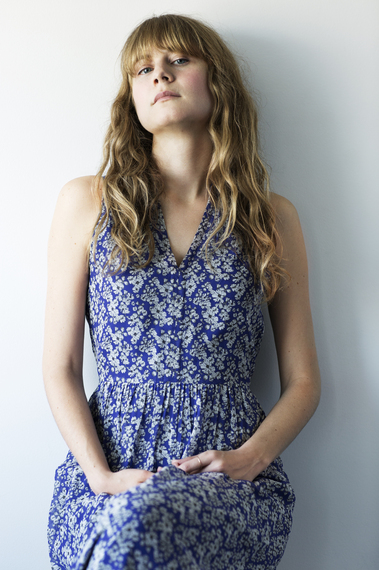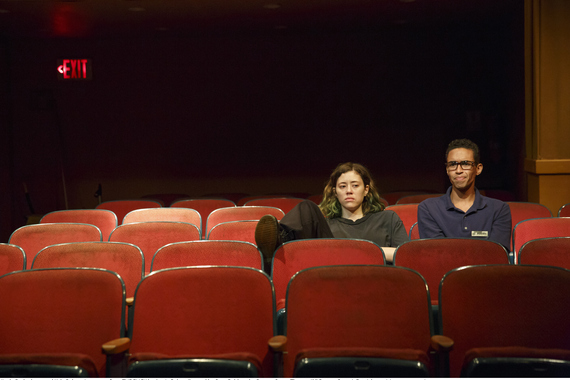
Annie Baker. Photo: © Brigitte Lacombe
Annie Baker arrived in New York in 2008 with Body Awareness, followed by the breakthrough hit Circle Mirror Transformation (2009); The Aliens (2010); a new adaptation of Uncle Vanya (2012); the Pulitzer Prize-winning The Flick (2013); and John (2015). We sat with her for a two-part interview on an early-Autumn day in Bryant Park, with construction workers drilling on one side and novice bowling pin jugglers practicing on the other.
PART 1: THE PLAYWRIGHT
You have now had six plays produced in New York over eight years. At some point along the way did you feel like you were now an established playwright, that you had finally "made it"?
ANNIE BAKER: It was honestly when Jim Houghton called and offered me a Signature Theatre Residency, because basically they guarantee you three productions in five years. I only write two plays every five years, and they basically were like "bring us a new play and if you feel strongly about it we'll do it." That was the moment. It really changed the writing process, actually, because I do remember very clearly what it was like to write a play before, always worrying. I mean, you always worry whether or not it's good, that doesn't go away; being absolutely terrified that you're going to write something terrible. But what has gone away since the Signature Residency are the sort of practical concerns that I think emerging playwrights have to deal with. The cast size, and the set, and is this going to be too challenging for artistic directors? Even in the writing of the text. I feel like my texts never fully communicate on paper; they never really work in terms of submissions, with someone reading my play if they hadn't seen my work before. I just don't think that my plays, on the paper, communicate at all. So what the Signature did basically was to give me permission to trust, and permission to write what I want to write. So that was huge, that was a big moment in my life.
Was this after The Flick?
ANNIE BAKER: No, before. I think Jim called me in 2012. I still had this outstanding commission at Playwrights Horizons, for which I was writing The Flick. When I signed on to the Signature thing, I said first I had to finish this play I was in the middle of for Playwrights Horizons. So I'd say that the change in the writing process--that sort of permission the Signature Residency gave--that was the writing process for John, and for the new plays that I'm working on now.
Have you reached the point where you reasonably expect that everything you write is going to get staged?
ANNIE BAKER: Well, there's never a guarantee. Jim Houghton could easily say "no" to something I give him, so you're never sure. But I'm lucky enough to be in this moment--which I don't think will last long, maybe a couple of years--when you feel that it's very likely that what you write will get performed, and that is unusual. But it's not a guarantee.
When you started writing plays, how long did it take before you received a major production?
ANNIE BAKER: My first full-length play that I wrote after college was produced in New York, which I feel was very lucky and unusual. It wasn't produced until I was twenty-eight, but I really had taken a break from writing plays after college, so I didn't write that play until I was twenty-six or so. So while it seemed like this epic period of time when I was working day jobs and sending my work out, now in retrospect I feel like I was so lucky that it was only a few years. It really wasn't that bad, but when you're twenty-six it feels very different.
Did you have civilian jobs before your first play was done?
ANNIE BAKER: I had a lot of jobs. My longest civilian job--which was also my most fun civilian job--was working for "Who Wants to Be a Millionaire?" That paid my bills for years. It was also a great job, and the hours were great. First I was a script PA, and then I was promoted to fact checker. That's what I was doing when I was writing plays in my mid-twenties and sending them out. The other great thing about that job was that it was eight months a year and then four months we were off; I was on unemployment, and that was incredible. That was like a gift. So that job was huge, and I found it on Craigslist. I found all my jobs on Craigslist. I also work at St. Mark's Bookshop, and for a radio show. I also was a nanny when I graduated from college. The struggle seemed epic at the time; but now I'm like, "I could have done that for a few more years." I never was a bartender, I should have done that.
There is a long-running controversy about the lack of opportunity for women playwrights and directors in the professional theatre. This erupted over the summer when the Manhattan Theatre Club announced its production slate for 2015-16, with almost every play written and directed by white men. While you personally do not seem to have trouble getting your plays produced, do you see this as an important issue?
ANNIE BAKER: I definitely think there's a problem, but I think it's a much bigger problem than just gender. I think it's a problem about diversity: in terms of race, in terms of the class of the people being written about, and in terms of formula experimentation. I do think there needs to be way more adventurousness in theatre programming, and I think producing more women writers is one of many ways to be adventurous. I think there needs to be way more diversity in programming, but diversity for me means more than just women: if it's all plays about wealthy white women, that's not going to help us. You really have to look at the whole picture and see whose story is being told, in terms of geography, gender, class, race. I also think a big problem is not doing work that's experimental enough. If they moved away from more conventional plays--if the big non-profits programmed more experimental work--women and people of color would be writing a lot of those plays, so I almost feel like the problem would solve itself. But just focusing on gender worries me a little bit. 
Nicole Rodenburg and Kyle Beltran in the current cast of The Flick.
Photo: Joan Marcus
During the initial run of The Flick at Playwrights Horizons, Tim Sanford--the artistic director--sent an email to subscribers in which he tried to mollify those who had protested the play's three-hour running time. (This was before the play won the Pulitzer Prize.) How did you respond to that?
ANNIE BAKER: The whole experience was so strange; there was sort of a mini theatre media storm around that letter. Because of it, I'm now sort of known as "the person who writes long plays"; not because of the letter itself, but because of everything that happened after the letter. That's so strange to me, because there are a lot of people who write much longer plays than me. I feel like the first thing everybody asks me now is: Why Long Plays? I wrote two, The Flick and John; my next play's not that long. It's never my intention, like "I'm going to write a long play!" For me, it's figuring out the container: the space container and the time container, what the play needs and what's going to make it a deep and complex experience for the audience. I don't think of myself as a person who writes long plays, and I don't actually think my plays are that long. But I think because of the Playwrights letter--and because of all the articles that were written about it--that it became the first thing people say about me: she writes long plays. I don't know ultimately that I really care, but it's sort of interesting how that works.
[READ PART 2 OF OUR INTERVIEW here]
The Flick is currently playing, through January 10, 2016, at the Barrow Street Theatre in Greenwich Village
